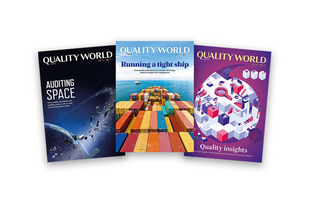
Best of the CQI eLibrary: change management
Progress indicator
Change management is a major challenge for quality professionals today. We highlight five of the latest articles on change management.
From driving change in quality management to navigating a changing business landscape caused by economic and political uncertainty, knowing how to plan and respond is priceless.
The CQI eLibrary is filled with thousands of the world’s leading professional articles, reports, journals and magazines – available as part of your CQI membership. Here are five of the latest articles from the eLibrary on change management.
Overcoming resistance to change in engineering and construction: Change management factors for owner organizations
For owner organisations in the architecture, engineering, and construction industry, successful implementation of new processes for procuring, contracting, and managing requires a concerted change management effort. The objective of this study was to empirically measure the impact of individual change management factors on minimising resistance from organisational members during implementation, which is often cited as a major reason for organizational change failure.
Creating Management Processes Built For Change
This article discusses the need for an agile management processes that can help organisations to create changes when needed, particularly with fast-changing business environments. Topics include a study of public global companies between 1980 and 2012 using performance data relating to organisational agility. It analyses strategising and testing, good management practices and companies such as Netflix that demonstrated exemplary management basics.
Organizations Don’t Resist Change, People Do: Modelling Individual Reactions to Organizational Change Through Loss and Terror Management
This article has three premises that stand in contrast to contemporary organisational research. First, examination of resistance must start with the individual. Organisations don’t resist change, people do. Second, people react not to the per se, but to the loss it represents. Third, loss engenders a deeply rooted peril response that is largely emotional in nature. The authors apply Terror Theory to locate resistance in existential buffers: emotional defence mechanisms that prevent awareness of loss and allow participation in a larger meaningful system.
ROFO principle generates ownership, commitment and team learning – mindset change before implementing total quality management
This paper states that Most CEOs do not understand that the right mindset must be nurtured first before embarking on TQM – and that the right mindset can be achieved through the ROFO principle. It can start with a simple task such as fixing a broken tap. Organisations that have difficulty in fixing simple problems would face even more challenges in executing TQM. In the absence of the right mindset, CEOs execute TQM using a top-down approach which is unsustainable. Included in this paper is an example of a company which had implemented the ROFO principle so successfully that its entire quality department was disbanded.
Does management innovation need a new change model?
This article discusses the role of innovation in business development during situations of economic slowdown and in the consumption and demand of product, and also suggests ways for improving the innovation process. Topics discussed include language barriers that could affect the understanding of terminology, alliance of shareholder value theory and hierarchical bureaucracy, and exemplars of innovative.
Like the sound of these articles? Log in to the eLibrary and read more.
Search the eLibrary
The eLibrary has thousands of articles, journals, reports and magazines.
Member only

This article is free to access for a limited time only. Only CQI and IRCA members receive access to all content.